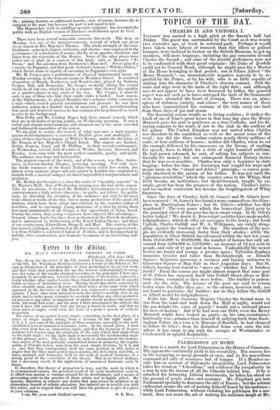TOPICS GF THE DAY.
CHARLES II. AND VICTORIA. I.
ILLUSION was carried to a high pitch at the Queen's ball last Friday. The guest was surrounded by the Court as it was nearly two centuries ago, at least in outward garb. Perhaps it would have taken more labour of research than fair idlers or gallant loungers were inclined to bestow on the British Museum, to get up manners, still more language; imitating the gay concourse around Charles the Second ; and some of the notable performers were not to be confounded with their great originals : the Duke of liorfolk could not be General Monk, although he might pass for a Nester of the Horse belonging to that period; nor is Prince Albert "the Merry Monarch,"—an unmistakeable negative scarcely to be re- gretted by the Prince, or by his wife, who is as little capable of sinking into the character of Charles's obscure consort. Still the coats and wigs were in the main of the right date ; and although sacs do not appear to have been favoured by ladies, the general aspect was not such as to have outraged the taste of De Grammont or to have alienated the heart of Sermyn. There was an atmo- sphere of richness, variety, and colour : the very names of those who have immortalized the costume of the time carry one back from these days of gas and steam. The decennial census recalls us to living realities ; it strikes the knell of one of Time's great hours in that long day since the Merry Monarch gave his soul to penitence as a true Catholic, and his de- caying remains to the tomb if not to the sink in the scullery of his palace. The United Kingdom was not united when Charles was dissolute in the sepulchral as well as the moral sense of the word ; nor did the three realms contain nearly thirty millions of souls, or four millions of houses ; neither did Charles, when he set the example followed by his successors on the throne' of reading his speech, have to blush for a debt of eight hundred millions. He had grown ashamed, he said, of asking his subjects so con- tinually for money ; but our subsequent financial history shows that he was over-sensitive. Charles was only a beginner in state begging : before his time the Sovereign had sought his ways and means more on the "stand and deliver" principle,—a course pain- fully chastized in the person of his father. It was not until the "glorious revolution," which the country owes to the Whigs, that Debt became an institution; but thenceforward, taught by ex- ample, great has been the progress of the nation. Charles's naive and too modest confession has become the laughingstock of Whig financiers.
Since the days of Charles, both St. James's and St. Giles's have been removed : St. James's has found a more commodious dwelling- place in Buckingham Palace ; but St. Giles's—whither has that wandered ? The very name which the benevolent Dyot gave to the principal street of the poor has been swept-away. Is St. Giles's better lodged ? We doubt it. Benevolent aucieties have made model- lodginghouses, which do offer air and space to the lowly ; but Lord Carlisle, Charles Gatliff, and W. A. Wilkinson, are vainly strug- gling against the tendency of the day. The numbers of the peo- ple are evidently increasing faster than their abodes : while the population in Great Britain has advanced within the last ten years from 18,656,000 to 20,920,000, the number of houses has only ad- vanced from 3,694,000 to 3,870,000; an increase of 12 per,cent in people, and only of 41 per cent in houses. Undoubtedly the newer houses are larger and occupy a greater space : Tyburnia displays mansions broader and taller than Mecklenburgh or Russell Square ; Belgravia possesses a vastness and luxury unknown to Grosvenor Square or May Fair in their Augustan days. But St. Giles's, having been forced to "move on," whither has it betaken itself ? From the census one might almost suspect that some part of St. Giles's has squeezed itself into Tothill Street alleys or Hol- born slums, crammed as they were before. The builder is patron- ized—by the rich. The houses of the poor are said to return better rents the fuller they are : so the owners, however rich, are not found to patronize the builder ; nor do they follow the Qatar or Albert model for lodginghouses.
If his late Most Gracious Majesty Charles the Second were to rise from the tomb and walk down the Mall at night, would not the gas delight his sense of gayety ! would not a railroad please his love of motion ! But if he had seen our Debt, even the Merry Monarch might have looked as grave—as his own countenance habitually was ; grimmer than himself if, sallying forth from Buck- ingham Palace on a tour a la Haroun-el-Raschid, he had chanced to follow St. Giles's from its disturbed home even unto the lair where it has crept to pig with the savages of Westminster or Clerkenwell in squalid hospitality.


























 Previous page
Previous page